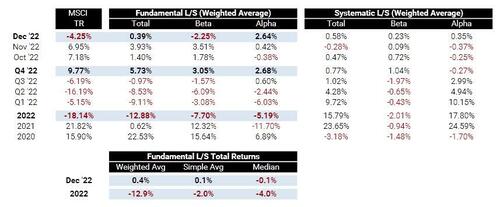Citadel Posts Record $35.5 Billion In Revenue For Hedge Fund, Securities Operations
Yesterday we listed some of the best and worst performing hedge funds of 2022: we missed the most important one.
After a stellar 2021, when it generated $16.2 billion in revenue, in 2022 Ken Griffen’s Citadel hedge fund – which had $54.5 billion in AUM as of Jan 1 – had a blowout year, and according to the WSJ, it generated about $28 billion in revenue, citing sources. It wasn’t immediately clear what exactly is meant by “revenue” here: new funds, services rendered, or unbooked and booked gains, but whatever it is, the number is a lot, and follows an impressive 38.1% return at the company’s flagship multi-strategy fund, Wellington. It also far outstripped the hedge fund’s prior record of $16.2 billion the year before.
Additionally, Citadel Securities, a separate entity and one of the world’s biggest electronic-trading firms, had $7.5 billion in revenue, also up from the prior record of $7 billion in 2021. Although in a market where there has been virtually no “lit” (or exchange liquidity) and where most trades have gone through internalizers like Citadel, this particular success is easier to comprehend.
And yes, those pointing out that companies which control both a hedge fund and a trading operation are not that different from SBF’s empire, which consisted for the FTX exchange and the Alameda hedge fund, are not too far off.
As the WSJ recounts, after its near-death experience in 2008, Citadel has outpaced many rivals in recent years, and each of its hedge funds posted double-digit gains after fees in 2022. Operating under tight risk controls that leave Citadel with little directional exposure to markets, the firm’s 1,000-plus traders make bets across asset classes in markets around the world. The firm doesn’t provide detailed information to clients about significant trades, though earlier in the year it told them it had benefited from successful commodities bets.
As for Citadel Securities, regular readers are quite familiar with it (not lease because of their threat to sue Zerohedge for suggesting it was frontrunning client orderflow just days before securities regulator FINRA accused it of doing just that) as a global market-making operation that handles more than 20% of the shares that change hands in U.S. stock markets each day. The business, which also trades futures, options, Treasuries and currencies, benefits from increased volumes and volatility, as well as reduced liquidity allowing it to pocket huge bid/ask spreads and prosper even when markets fall.
Furthermore, the pandemic-era boom in activity by retail investors benefited Citadel Securities’ so-called retail-wholesaler unit, which executes orders for brokerages such Robinhood and, to a lesser extent, Schwab.
The revenue bonanza will add to Griffen’s already considerable fortune who in addition to regularly breaking records in the real-estate and art markets, has emerged as a major GOP donor. Forbes estimates his wealth at around $31 billion.
To be sure, most other hedge funds have had a rougher year. As we noted yesterday, Goldman told its prime-brokerage clients that hedge funds betting on and against stocks lost an average 12.9% for the year, on an asset-weighted basis, while the S&P 500 lost about 18% including dividends.
Citadel’s flagship multi-strategy fund, Wellington, returned 38.1% by contrast. Previous reports from the WSJ revealed that commodities made up more than 60% of the second-quarter gross investment gains for Wellington.
But even more remarkably, all of Citadel’s five strategies—fixed income and macro, commodities, equities, quant and credit—were profitable for the year, according to WSJ sources. That was evident in the returns of its three other hedge funds, which notched gains of more than 20%. One of the funds, Citadel Equities, was up 21.4% for the year. Unable to keep up with its newfound wealth, Citadel returned about $8.5 billion in profits to its investors Dec. 31, up from the $7 billion it earlier expected.
Rivals Millennium Management and Point72 Asset Management gained 12.4% and 11.8% for the year, respectively. D.E. Shaw Group’s flagship multi-strategy fund, Composite, returned about 24.7%.
Tyler Durden
Thu, 01/05/2023 – 15:25
